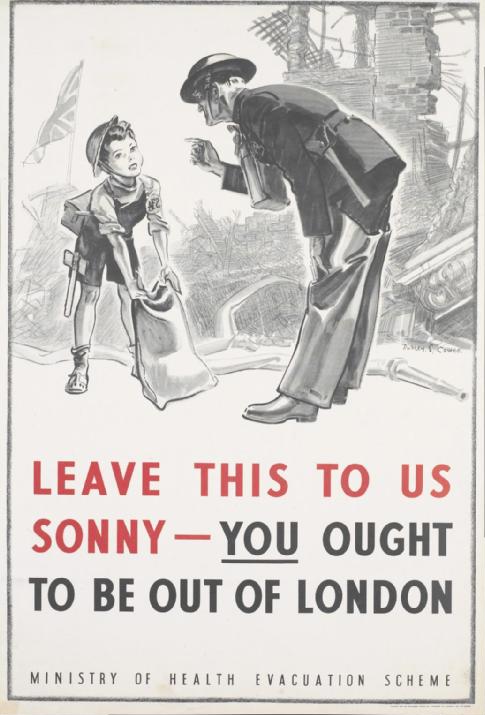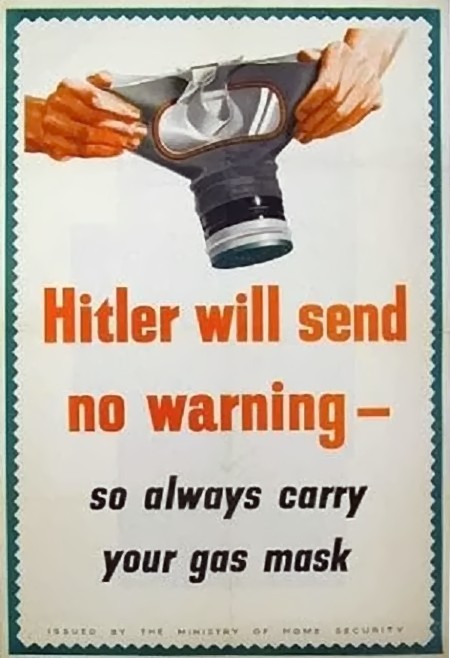|
Trekking During The Blitz
Large numbers of British civilians engaged in trekking during the Blitz. This involved leaving cities at night to sleep in nearby towns and rural areas. The practice was most prevalent in provincial cities during early 1941. While the British Government was concerned that trekking indicated that civilian morale was under strain, the practice was generally motivated by a desire to avoid the risk of death or injury and to be able to sleep. Incidence Trekking involved civilians in cities which were threatened with air attack during the Blitz leaving their homes at night to sleep in nearby towns and rural areas. These movements were not officially organised. Relatively few Londoners engaged in trekking compared to residents of secondary cities. The practice was most prevalent in London during the early stages of the Blitz in September 1940, with some civilians evacuating to the edge of the city and nearby towns. Some people who evacuated London each night did so in their cars, whic ... [...More Info...] [...Related Items...] OR: [Wikipedia] [Google] [Baidu] |
The Blitz
The Blitz was a German bombing campaign against the United Kingdom in 1940 and 1941, during the Second World War. The term was first used by the British press and originated from the term , the German word meaning 'lightning war'. The Germans conducted mass air attacks against industrial targets, towns, and cities, beginning with raids on London towards the end of the Battle of Britain in 1940 (a battle for daylight air superiority between the Luftwaffe and the Royal Air Force over the United Kingdom). By September 1940, the Luftwaffe had lost the Battle of Britain and the German air fleets () were ordered to attack London, to draw RAF Fighter Command into a battle of annihilation.Price 1990, p. 12. Adolf Hitler and Reichsmarschall Hermann Göring, commander-in-chief of the Luftwaffe, ordered the new policy on 6 September 1940. From 7 September 1940, London was systematically bombed by the Luftwaffe for 56 of the following 57 days and nights. Most notable was a large dayligh ... [...More Info...] [...Related Items...] OR: [Wikipedia] [Google] [Baidu] |
Official History
An official history is a work of history which is sponsored, authorised or endorsed by its subject. The term is most commonly used for histories which are produced for a government. The term also applies to commissions from non-state bodies including histories of commercial companies. An official biography (one written with the permission, cooperation and sometimes the participation of its subject or heirs) is an authorised biography. Official histories frequently have the advantage that the author has had access to archives, been allowed to interview subjects and use other primary sources closed to independent historians. Because of the close relationship between author and subject, such works may be (or be perceived to be) partisan in tone and to lack historical objectivity. Such bias varies and some official histories have been called exercises in propaganda; in other cases the authors have retained a measure of independence. Early official histories There is a tradition of his ... [...More Info...] [...Related Items...] OR: [Wikipedia] [Google] [Baidu] |
History Of The Second World War
The ''History of the Second World War'' is the official history of the British contribution to the Second World War and was published by Her Majesty's Stationery Office (HMSO). The immense project was sub-divided into areas to ease publication, ''United Kingdom Military Series'', the ''United Kingdom Civil Series'' for the civilian war effort; the ''Foreign Policy series'', the ''Intelligence series'' and the ''Medical series'' are eponymous. Other volumes not under the aegis of the series but published by HMSO may be read as adjuncts, covering matters not considered in great detail or at all, in one case, in the main series. Further volumes, published after the privatisation of HMSO or in the series about the Special Operations Executive, are also useful. The volumes were intended to be read individually, rather than in series, which led to some overlapping. In their introductions to their parts of the series, Sir Keith Hancock and Sir James Butler wrote that this was to obvi ... [...More Info...] [...Related Items...] OR: [Wikipedia] [Google] [Baidu] |
Evacuations Of Civilians In Britain During World War II
The evacuation of civilians in Britain during the Second World War was designed to protect people, especially children, from the risks associated with aerial bombing of cities by moving them to areas thought to be less at risk. Under the name "Operation Pied Piper", the effort began on 1 September 1939 and officially relocated 1.5 million people. There were further waves of official evacuation and re-evacuation from the south and east coasts in June 1940, when a seaborne invasion was expected, and from affected cities after the Blitz began in September 1940. Official evacuations also took place from the UK to other parts of the British Empire, and many non-official evacuations within and from the UK. Other mass movements of civilians included British citizens arriving from the Channel Islands, and displaced people arriving from continental Europe. Background The Government Evacuation Scheme was developed during the summer of 1938 by the Anderson Committee and implemented b ... [...More Info...] [...Related Items...] OR: [Wikipedia] [Google] [Baidu] |
Exeter Blitz
The term Exeter Blitz refers to the air raids by the German ''Luftwaffe'' on the British city of Exeter, Devon, during the Second World War. The city was bombed in April and May 1942 as part of the so-called "Baedeker raids", in which targets were chosen for their cultural and historical, rather than their strategic or military, value. Early raids The first German air raid on Exeter took place on 7 August 1940, in the early stages of the Battle of Britain. A lone raider dropped a stick of five bombs on the St Thomas area of the town, causing little damage. The local paper reported one man was injured and a canary and several chickens were killed. A further 18 raids were made against the city over the next 18 months, mostly hit-and-run raids by lone raiders. Exeter was little affected during the Blitz, the German night-bombing offensive against Britain's cities, though nearby Plymouth was severely damaged in early 1941. This changed in 1942 when Exeter became the first target ... [...More Info...] [...Related Items...] OR: [Wikipedia] [Google] [Baidu] |
Exeter
Exeter () is a city in Devon, South West England. It is situated on the River Exe, approximately northeast of Plymouth and southwest of Bristol. In Roman Britain, Exeter was established as the base of Legio II Augusta under the personal command of Vespasian. Exeter became a religious centre in the Middle Ages. Exeter Cathedral, founded in the mid 11th century, became Anglican in the 16th-century English Reformation. Exeter became an affluent centre for the wool trade, although by the First World War the city was in decline. After the Second World War, much of the city centre was rebuilt and is now a centre for education, business and tourism in Devon and Cornwall. It is home to two of the constituent campuses of the University of Exeter: Streatham and St Luke's. The administrative area of Exeter has the status of a non-metropolitan district under the administration of the County Council. It is the county town of Devon and home to the headquarters of Devon County Council. A p ... [...More Info...] [...Related Items...] OR: [Wikipedia] [Google] [Baidu] |
Department Of Health And Social Care
The Department of Health and Social Care (DHSC) is a department of His Majesty's Government responsible for government policy on health and adult social care matters in England, along with a few elements of the same matters which are not otherwise devolved to the Scottish Government, Welsh Government or Northern Ireland Executive. It oversees the English National Health Service (NHS). The department is led by the secretary of state for health and social care with three ministers of state and three parliamentary under-secretaries of state. The department develops policies and guidelines to improve the quality of care and to meet patient expectations. It carries out some of its work through arms-length bodies (ALBs), including executive non-departmental public bodies such as NHS England and the NHS Digital, and executive agencies such as the UK Health Security Agency and the Medicines and Healthcare products Regulatory Agency (MHRA). The DHSC also manages the work of the Nation ... [...More Info...] [...Related Items...] OR: [Wikipedia] [Google] [Baidu] |
Bellwether
A bellwether is a leader or an indicator of trends.bellwether " ''Cambridge Dictionary''. Retrieved 2022-01-22. In , the term often applies in a metaphorical sense to characterize a geographic region where political tendencies match in microcosm those of a wider area, such that the result of an in the former region might predict the eventual result in the latter. In |
World War II
World War II or the Second World War, often abbreviated as WWII or WW2, was a world war that lasted from 1939 to 1945. It involved the vast majority of the world's countries—including all of the great powers—forming two opposing military alliances: the Allies and the Axis powers. World War II was a total war that directly involved more than 100 million personnel from more than 30 countries. The major participants in the war threw their entire economic, industrial, and scientific capabilities behind the war effort, blurring the distinction between civilian and military resources. Aircraft played a major role in the conflict, enabling the strategic bombing of population centres and deploying the only two nuclear weapons ever used in war. World War II was by far the deadliest conflict in human history; it resulted in 70 to 85 million fatalities, mostly among civilians. Tens of millions died due to genocides (including the Holocaust), starvation, ma ... [...More Info...] [...Related Items...] OR: [Wikipedia] [Google] [Baidu] |
Ministry Of Home Security
The Ministry of Home Security was a British government department established in 1939 to direct national civil defence, primarily tasked with organising air raid precautions, during the Second World War. The Ministry for Home Security was headed by Sir John Anderson, the Home Secretary and Minister of Home Security. The Ministry's responsibilities covered all central and regional civil defence organisations, such as air raid wardens, rescue squads, fire services, and the Women’s Voluntary Service. It was also responsible for giving approval to local ARP schemes and providing public shelters. The Ministry, run under the auspices of the Home Office, produced hundreds of leaflets that were delivered to the population and advised on how to deal with the impending air raids. It also managed propaganda poster campaigns, such as to encourage the carrying of gas masks and volunteers to join civil defence groups like the Fire Guards. In October 1940, Sir John Anderson was replaced by H ... [...More Info...] [...Related Items...] OR: [Wikipedia] [Google] [Baidu] |
Home Secretary
The secretary of state for the Home Department, otherwise known as the home secretary, is a senior minister of the Crown in the Government of the United Kingdom. The home secretary leads the Home Office, and is responsible for all national security, policing and immigration policies of the United Kingdom. As a Great Office of State, the home secretary is one of the most senior and influential ministers in the government. The incumbent is a statutory member of the British Cabinet and National Security Council. The position, which may be known as interior minister in other nations, was created in 1782, though its responsibilities have changed many times. Past office holders have included the prime ministers Lord North, Robert Peel, the Duke of Wellington, Lord Palmerston, Winston Churchill, James Callaghan and Theresa May. In 2007, Jacqui Smith became the first female home secretary. The incumbent home secretary is Suella Braverman. The office holder works alongside the ot ... [...More Info...] [...Related Items...] OR: [Wikipedia] [Google] [Baidu] |
Herbert Morrison
Herbert Stanley Morrison, Baron Morrison of Lambeth, (3 January 1888 – 6 March 1965) was a British politician who held a variety of senior positions in the UK Cabinet as member of the Labour Party. During the inter-war period, he was Minister of Transport during the Second MacDonald ministry, then after losing his parliamentary seat in the 1931 United Kingdom general election, he became Leader of the London County Council in the 1930s. After returning to the Commons, he was defeated by Clement Attlee in the 1935 Labour Party leadership election but later acted as Home Secretary in the wartime coalition. Morrison organised Labour's victorious 1945 election campaign, and was appointed Leader of the House of Commons and acted as Attlee's deputy in the Attlee ministry of 1945–51. Attlee, Morrison, Ernest Bevin, Stafford Cripps, and initially Hugh Dalton formed the "Big Five" who dominated those governments. Morrison oversaw Labour's nationalisation programme, although he op ... [...More Info...] [...Related Items...] OR: [Wikipedia] [Google] [Baidu] |







